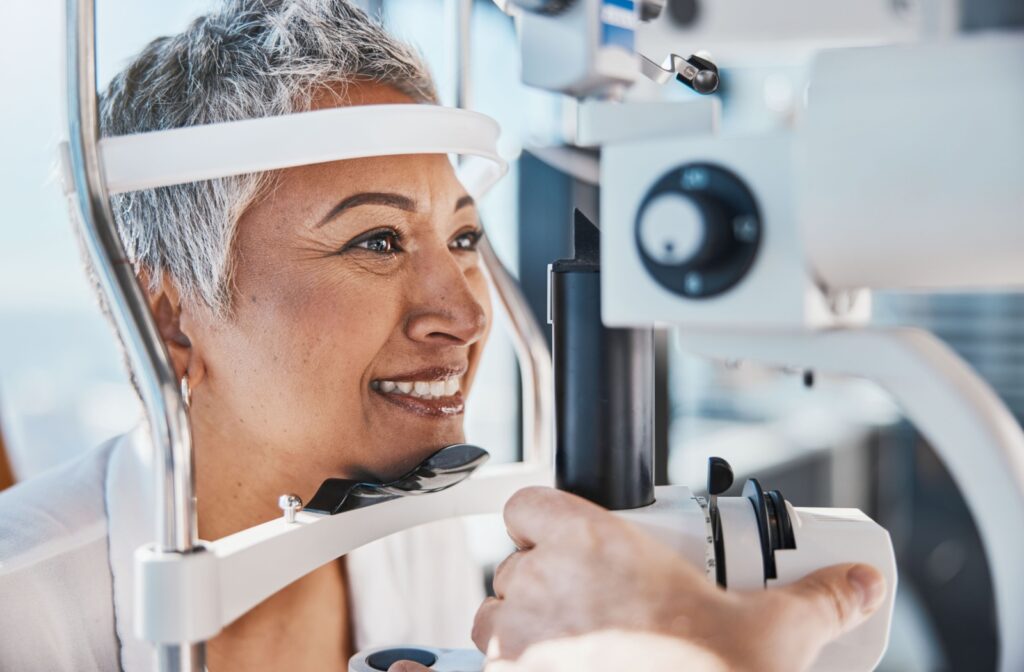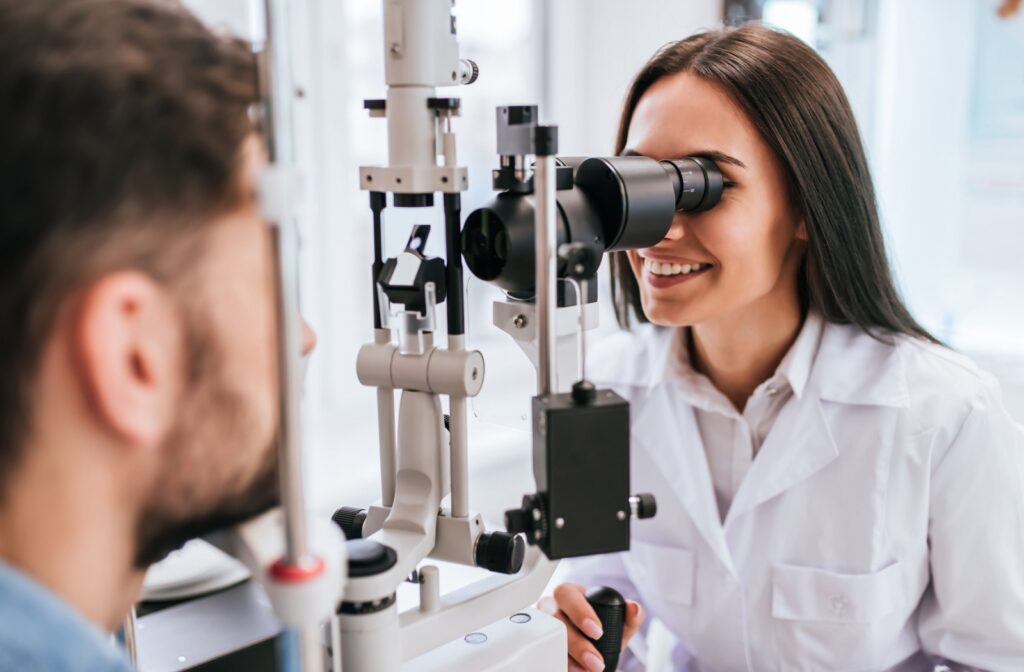Regular eye exams are one of the simplest ways to take care of your eyes and vision. But when you visit your optometrist for an eye exam, you might be surprised to learn that there isn’t just one type of eye exam.
There are two types of eye exams, each with its own purpose:
- Routine comprehensive eye exams, designed to test your visual acuity and overall visual abilities
- Medical comprehensive eye exams, designed to thoroughly check your eyes for all kinds of different eye conditions
While they have some similarities, these exams take different approaches to your eye health. So what are the key differences between routine and medical eye exams?
What to Expect from a Routine Eye Exam
When you go for a routine eye exam, you’re essentially getting a check-up for your eyes. These exams begin with a quick discussion about your vision, family history, and medical history. If you’ve noticed any changes in your vision, make sure to mention this; anything unusual occurring may be a sign that something is wrong with your eyes.
Your optometrist will spend some time asking you questions about your overall lifestyle in order to gain a better understanding of your overall health, and then the exam will begin.
During the exam, your optometrist will test your:
- Visual acuity using an eye chart
- Eye alignment and coordination
- Peripheral (side) vision
- Depth perception
Once the exam is done, you’ll be given an updated prescription. If your optometrist has any concerns or advice, they’ll mention it at the end of your appointment. If they notice anything unusual, they’ll look into it further and examine the internal mechanisms of your eye to find out what’s going on.
How Often Should You Have Eye Exams?
Your eyes are sensitive, and any sudden changes are abnormal. If you ever notice significant changes or odd symptoms, don’t put off visiting the optometrist; an eye exam could mean the difference between permanent damage to your vision or keeping your eyesight clear.
The frequency of your exams depends on a few factors. Your age, health, lifestyle, and overall risk factors all need to be accounted for, but typically you should try to follow these guidelines:
- At least 1 exam per year for children under the age of 19
- At least 1 exam every 2 years for adults between the ages of 20-64
- At least 1 exam per year for seniors over the age of 65
- At least 1 exam per year if you live with diabetes
If you have any previously diagnosed conditions, it helps to visit your optometrist more often. Many eye conditions develop slowly and subtly, often without any obvious indicators. Don’t put your health at risk; eye exams are an essential part of enjoying clear, comfortable vision.
What Are Medical Eye Exams?
While routine eye exams are essential for maintaining overall eye health, medical eye exams are more specialized. Rather than focusing on your eyesight, a medical eye exam prioritizes diagnosing and managing complex eye conditions.
These exams are usually performed by an ophthalmologist—a medical doctor specializing in eye care—and include a more extensive range of tools and technology. During a medical eye exam, your eye care professional will examine you by:
- Dilating your pupils to get a better view of the internal structures of your eyes
- Checking your eye pressure to screen for glaucoma
- Conducting a slit-lamp examination to inspect the front part of your eye
- Using advanced imaging techniques to examine the retina and optic nerve
- Performing visual field tests to detect any blind spots or peripheral vision issues
- Ordering additional tests or imaging if specific eye conditions are suspected
Once the exam is over, your eye doctor will give you advice on follow-up care. They will also prescribe medication if needed. These exams don’t focus too heavily on your vision; they prioritize keeping your eyes healthy and disease-free.

What Diseases Can An Eye Exam Detect?
Medical eye exams are essential for catching potential problems long before they can damage your vision. During a medical eye exam, your ophthalmologist will be looking for conditions such as:
- Glaucoma, a group of conditions that increase intraocular pressure and damage the optic nerve
- Cataracts, where the eye’s natural lens begins to cloud over
- Age-related macular degeneration (AMD), which affects the central part of the retina and can lead to vision loss
- Diabetic retinopathy, a complication of diabetes that affects the blood vessels in the retina
These conditions can all develop without any obvious symptoms, making it essential to regularly see your optometrist. An early diagnosis is key to preserving your eyesight and can make a significant difference in your quality of life.
Take Charge of Your Eye Health
Your eyes are crucial to your everyday life, so you should always try to take care of them. Eye exams with our team at Dr. Goldstone Vision Center are a simple way to take charge of your eye health. Our team is here for all of your eye care needs, so book an appointment with us today!



